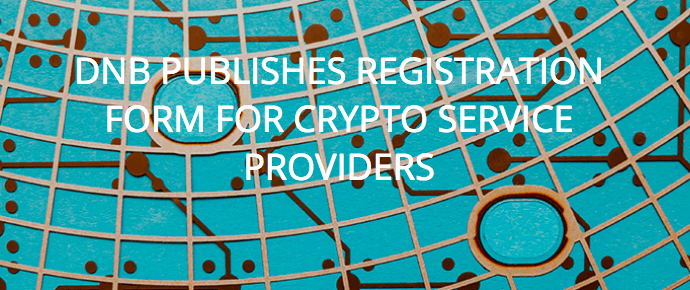The Dutch Central Bank (DNB) has published a draft registration form for providers of crypto services, which these providers must use to register with DNB. The registration requirement will apply to everyone who through their professional work or business provides services as a virtual currency-exchange provider or a custodian-wallet provider in or from the Netherlands.
Registration form
The draft registration form has been published by DNB together with a draft explanation that will help crypto-service providers prepare themselves properly and collect the required information in advance. The completed draft registration form can be accessed and submitted now.
In addition, DNB has published information on the costs associated with registration and a request for an assessment of (co-)policymakers. These documents are based on requirements contained in the current draft legislation. As the legislative process has not yet been completed, changes may still take place in registration requirements.
The definitive list of information and regulations will be published when the final legislation comes into force. Initially, the legislation would take effect as of 10 January 2020. The legislative proposal, however, is still to be adopted by the Dutch Senate (Eerste Kamer). This means that, for the time being, crypto providers remain uncertain about the exact requirements under the new legislation.
Registering
On 10 December 2019, the Dutch House of Representatives (Tweede Kamer) adopted a legislative proposal implementing the Fifth Anti-Money Laundering Directive (5AMLD) and amending the Dutch Anti-Money Laundering and Terrorist Financing Act (Dutch Money Laundering Act).
The adopted proposal included a registration requirement for crypto-service providers, which applies to everyone who through their professional work or business provide services as virtual currency exchange providers or custodian-wallet providers based in the Netherlands.
During the registration process, DNB will determine if a service provider is able to comply with the obligations set down in the Dutch Money Laundering Act.
Due diligence and reporting suspicious activities
Because virtual currency-exchange and custodian-wallet providers fall outside the reach of regulators (and hence face no legal obligations to identify suspicious activity), EU lawmakers determined that the anonymous nature of virtual currencies makes them prone to criminal misuse, which is a problem that the 5AMLD attempts to address by making crypto services subject to customer due diligence and reporting if suspicious activities are detected.
As a result of amendments to the Dutch Money Laundering Act, crypto-service providers will need to comply fully with these obligations.
Specifically, virtual currency exchanges and wallets will need to adhere to ‘know your customer’ protocols and collect data on users that they may need to share with authorities. Furthermore, crypto-service providers will be required to report unusual transactions to the Financial Intelligence Unit Netherlands and to cooperate with any investigations.
For more information about these new requirements, please contact CMS experts Clair Wermers or Karsten Bruinsma.
Original article here.


